Graduate Diploma: DAM792 New Zealand Tourism Sustainability Report
VerifiedAdded on 2023/01/12
|22
|5326
|77
Report
AI Summary
This report provides a comprehensive analysis of sustainability within the New Zealand tourism industry, with a specific focus on the Grand Chancellor Hotel. It begins with an executive summary and an overview of the organization, detailing its location, services, and vision. The literature review explores the concept of sustainability, examining its environmental, social, and economic pillars, alongside the sustainable initiatives of the New Zealand Tourism Sustainability Commitment. The report critically evaluates these sustainability approaches, comparing theory and practice, and discusses the integration of sustainability into business practices, outlining both benefits and complications. Furthermore, the report delves into the sustainable practices of the Grand Chancellor Hotel, assessing its economic, visitor, host community, and environmental commitments. A conclusion summarizes the findings, and recommendations are provided to enhance the hotel's alignment with the New Zealand Tourism Committee's sustainability goals. The report uses the three pillars of sustainability to critically evaluate the organization's practices. The report also uses the New Zealand Tourism Sustainability Commitment to evaluate the hotel's performance.

DAM792: New Zealand Tourism Management
New Zealand Tourism Management
New Zealand Tourism Management
Paraphrase This Document
Need a fresh take? Get an instant paraphrase of this document with our AI Paraphraser
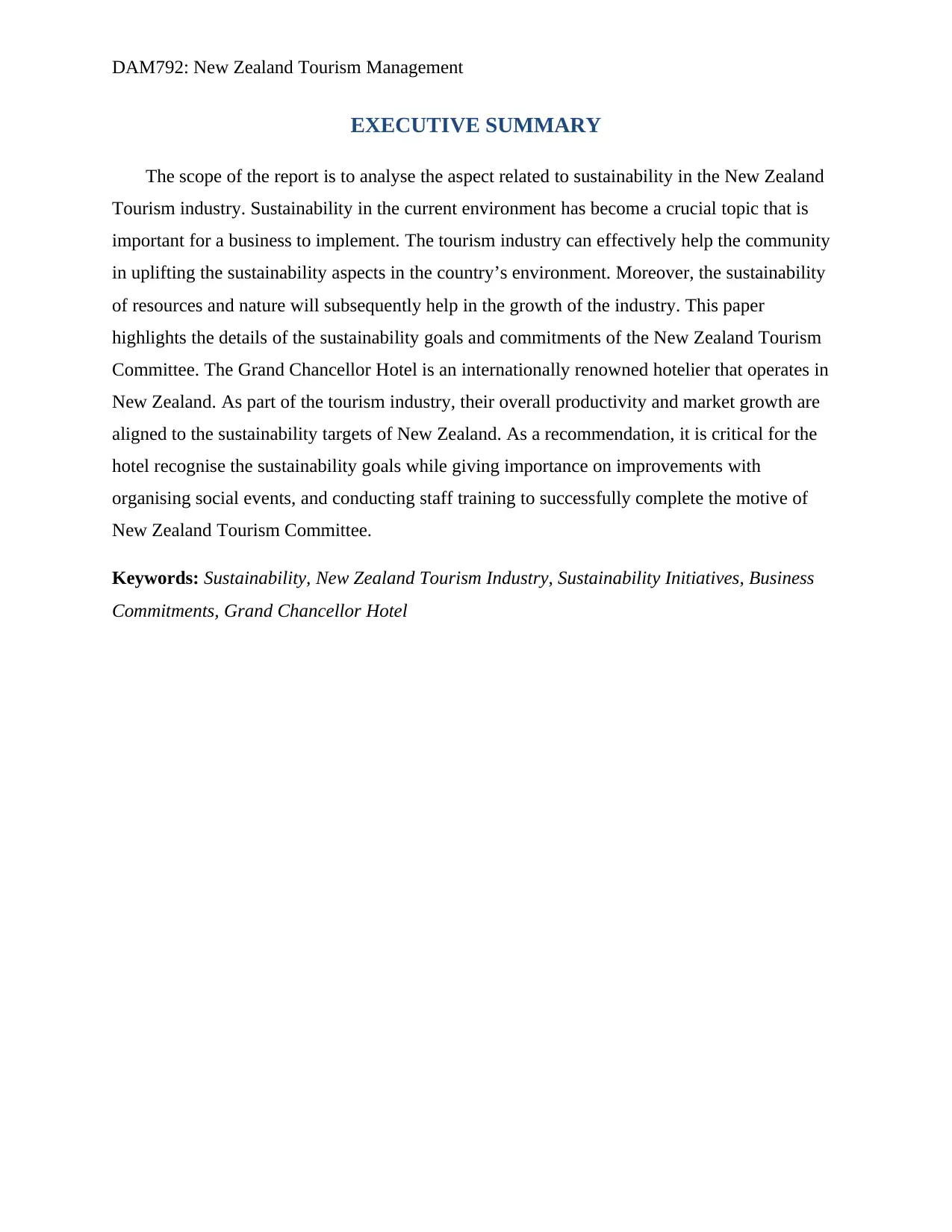
DAM792: New Zealand Tourism Management
EXECUTIVE SUMMARY
The scope of the report is to analyse the aspect related to sustainability in the New Zealand
Tourism industry. Sustainability in the current environment has become a crucial topic that is
important for a business to implement. The tourism industry can effectively help the community
in uplifting the sustainability aspects in the country’s environment. Moreover, the sustainability
of resources and nature will subsequently help in the growth of the industry. This paper
highlights the details of the sustainability goals and commitments of the New Zealand Tourism
Committee. The Grand Chancellor Hotel is an internationally renowned hotelier that operates in
New Zealand. As part of the tourism industry, their overall productivity and market growth are
aligned to the sustainability targets of New Zealand. As a recommendation, it is critical for the
hotel recognise the sustainability goals while giving importance on improvements with
organising social events, and conducting staff training to successfully complete the motive of
New Zealand Tourism Committee.
Keywords: Sustainability, New Zealand Tourism Industry, Sustainability Initiatives, Business
Commitments, Grand Chancellor Hotel
EXECUTIVE SUMMARY
The scope of the report is to analyse the aspect related to sustainability in the New Zealand
Tourism industry. Sustainability in the current environment has become a crucial topic that is
important for a business to implement. The tourism industry can effectively help the community
in uplifting the sustainability aspects in the country’s environment. Moreover, the sustainability
of resources and nature will subsequently help in the growth of the industry. This paper
highlights the details of the sustainability goals and commitments of the New Zealand Tourism
Committee. The Grand Chancellor Hotel is an internationally renowned hotelier that operates in
New Zealand. As part of the tourism industry, their overall productivity and market growth are
aligned to the sustainability targets of New Zealand. As a recommendation, it is critical for the
hotel recognise the sustainability goals while giving importance on improvements with
organising social events, and conducting staff training to successfully complete the motive of
New Zealand Tourism Committee.
Keywords: Sustainability, New Zealand Tourism Industry, Sustainability Initiatives, Business
Commitments, Grand Chancellor Hotel
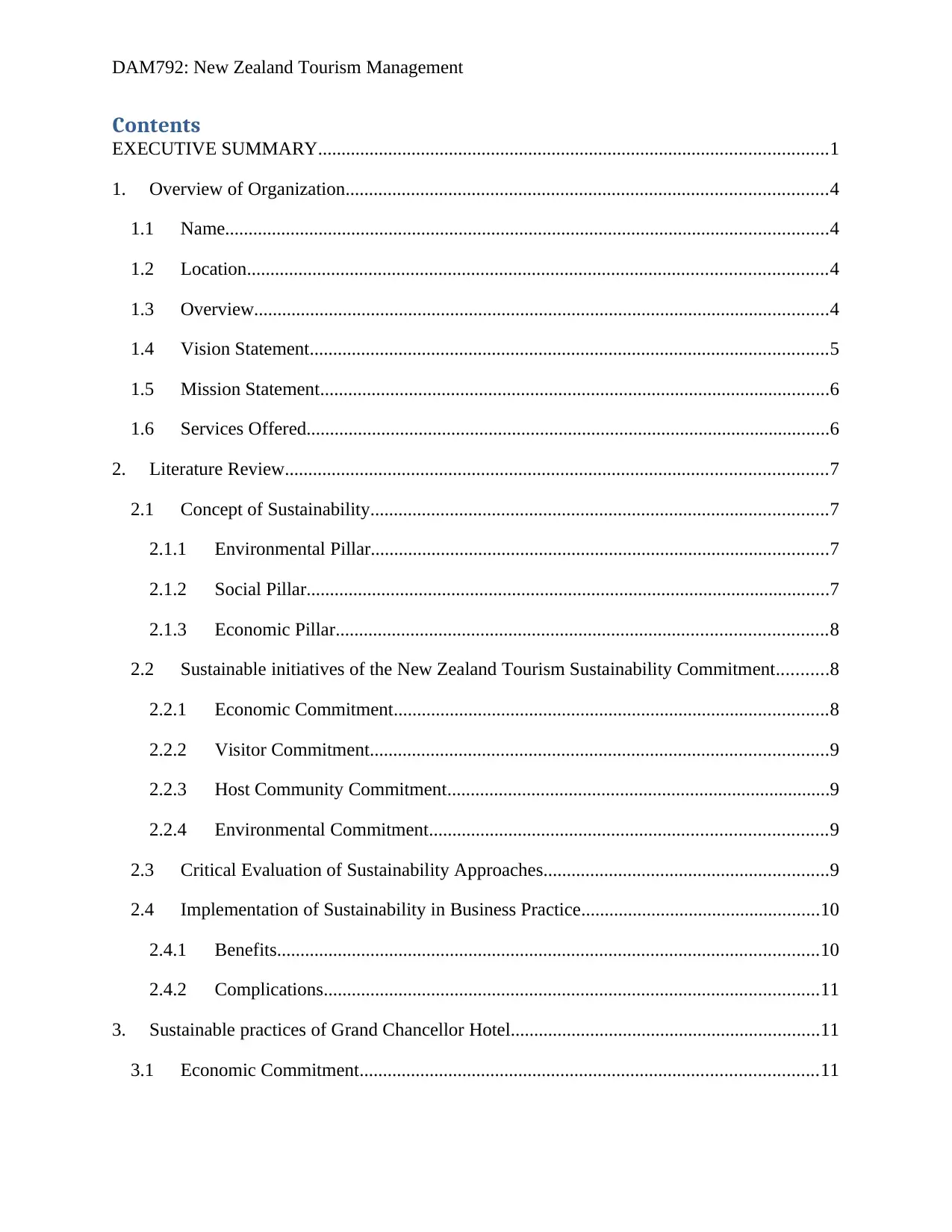
DAM792: New Zealand Tourism Management
Contents
EXECUTIVE SUMMARY.............................................................................................................1
1. Overview of Organization.......................................................................................................4
1.1 Name.................................................................................................................................4
1.2 Location............................................................................................................................4
1.3 Overview...........................................................................................................................4
1.4 Vision Statement...............................................................................................................5
1.5 Mission Statement.............................................................................................................6
1.6 Services Offered................................................................................................................6
2. Literature Review....................................................................................................................7
2.1 Concept of Sustainability..................................................................................................7
2.1.1 Environmental Pillar..................................................................................................7
2.1.2 Social Pillar................................................................................................................7
2.1.3 Economic Pillar.........................................................................................................8
2.2 Sustainable initiatives of the New Zealand Tourism Sustainability Commitment...........8
2.2.1 Economic Commitment.............................................................................................8
2.2.2 Visitor Commitment..................................................................................................9
2.2.3 Host Community Commitment..................................................................................9
2.2.4 Environmental Commitment.....................................................................................9
2.3 Critical Evaluation of Sustainability Approaches.............................................................9
2.4 Implementation of Sustainability in Business Practice...................................................10
2.4.1 Benefits....................................................................................................................10
2.4.2 Complications..........................................................................................................11
3. Sustainable practices of Grand Chancellor Hotel..................................................................11
3.1 Economic Commitment..................................................................................................11
Contents
EXECUTIVE SUMMARY.............................................................................................................1
1. Overview of Organization.......................................................................................................4
1.1 Name.................................................................................................................................4
1.2 Location............................................................................................................................4
1.3 Overview...........................................................................................................................4
1.4 Vision Statement...............................................................................................................5
1.5 Mission Statement.............................................................................................................6
1.6 Services Offered................................................................................................................6
2. Literature Review....................................................................................................................7
2.1 Concept of Sustainability..................................................................................................7
2.1.1 Environmental Pillar..................................................................................................7
2.1.2 Social Pillar................................................................................................................7
2.1.3 Economic Pillar.........................................................................................................8
2.2 Sustainable initiatives of the New Zealand Tourism Sustainability Commitment...........8
2.2.1 Economic Commitment.............................................................................................8
2.2.2 Visitor Commitment..................................................................................................9
2.2.3 Host Community Commitment..................................................................................9
2.2.4 Environmental Commitment.....................................................................................9
2.3 Critical Evaluation of Sustainability Approaches.............................................................9
2.4 Implementation of Sustainability in Business Practice...................................................10
2.4.1 Benefits....................................................................................................................10
2.4.2 Complications..........................................................................................................11
3. Sustainable practices of Grand Chancellor Hotel..................................................................11
3.1 Economic Commitment..................................................................................................11
⊘ This is a preview!⊘
Do you want full access?
Subscribe today to unlock all pages.

Trusted by 1+ million students worldwide
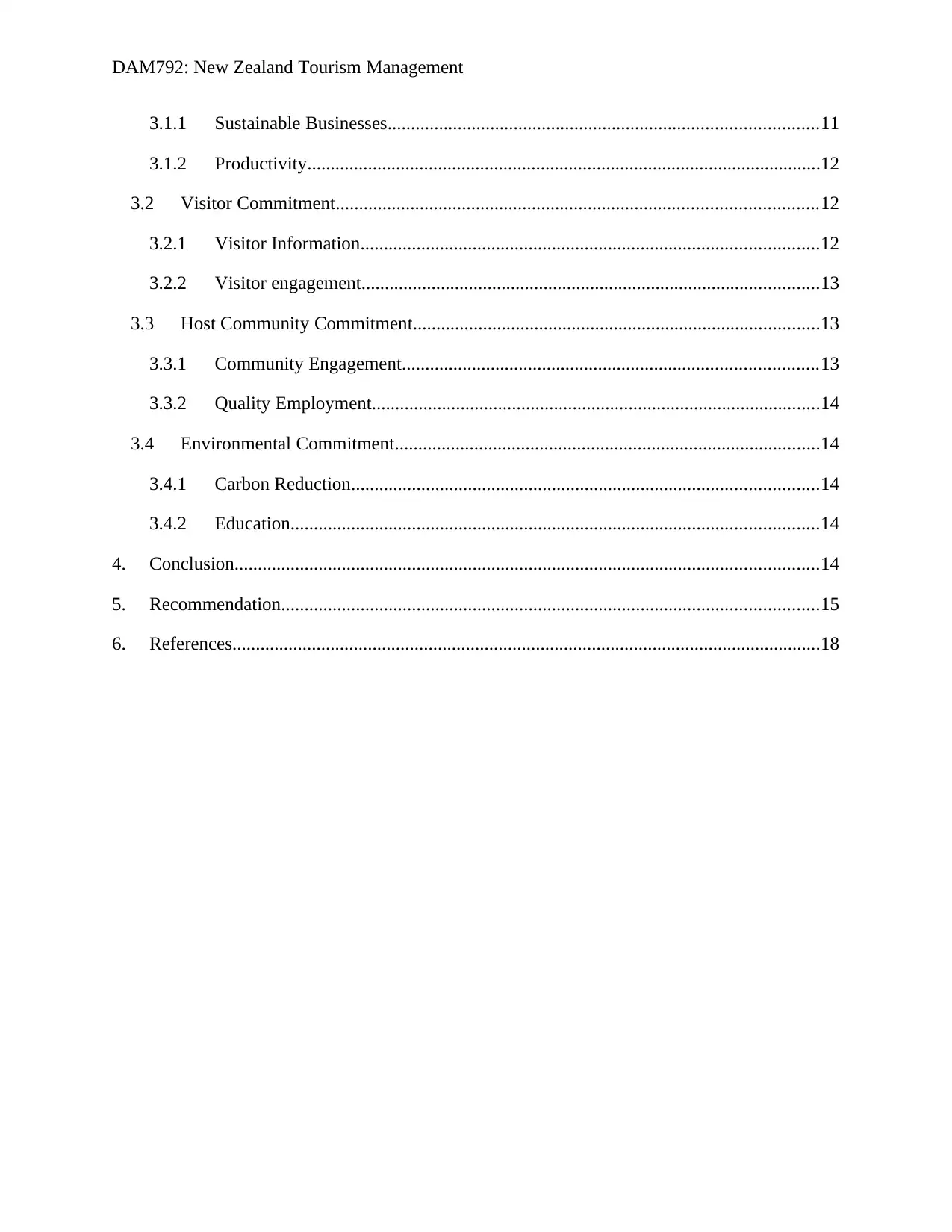
DAM792: New Zealand Tourism Management
3.1.1 Sustainable Businesses............................................................................................11
3.1.2 Productivity..............................................................................................................12
3.2 Visitor Commitment.......................................................................................................12
3.2.1 Visitor Information..................................................................................................12
3.2.2 Visitor engagement..................................................................................................13
3.3 Host Community Commitment.......................................................................................13
3.3.1 Community Engagement.........................................................................................13
3.3.2 Quality Employment................................................................................................14
3.4 Environmental Commitment...........................................................................................14
3.4.1 Carbon Reduction....................................................................................................14
3.4.2 Education.................................................................................................................14
4. Conclusion.............................................................................................................................14
5. Recommendation...................................................................................................................15
6. References..............................................................................................................................18
3.1.1 Sustainable Businesses............................................................................................11
3.1.2 Productivity..............................................................................................................12
3.2 Visitor Commitment.......................................................................................................12
3.2.1 Visitor Information..................................................................................................12
3.2.2 Visitor engagement..................................................................................................13
3.3 Host Community Commitment.......................................................................................13
3.3.1 Community Engagement.........................................................................................13
3.3.2 Quality Employment................................................................................................14
3.4 Environmental Commitment...........................................................................................14
3.4.1 Carbon Reduction....................................................................................................14
3.4.2 Education.................................................................................................................14
4. Conclusion.............................................................................................................................14
5. Recommendation...................................................................................................................15
6. References..............................................................................................................................18
Paraphrase This Document
Need a fresh take? Get an instant paraphrase of this document with our AI Paraphraser
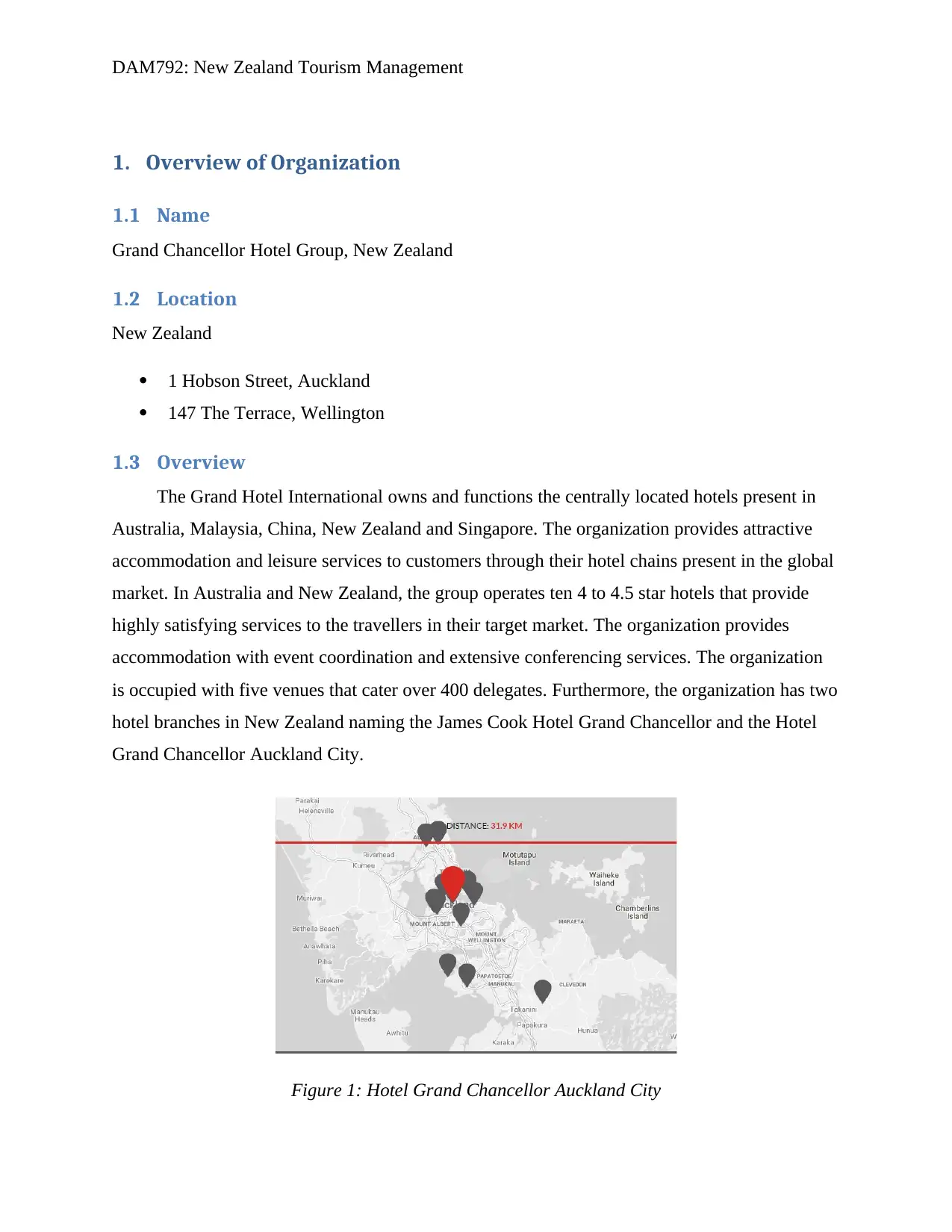
DAM792: New Zealand Tourism Management
1. Overview of Organization
1.1 Name
Grand Chancellor Hotel Group, New Zealand
1.2 Location
New Zealand
1 Hobson Street, Auckland
147 The Terrace, Wellington
1.3 Overview
The Grand Hotel International owns and functions the centrally located hotels present in
Australia, Malaysia, China, New Zealand and Singapore. The organization provides attractive
accommodation and leisure services to customers through their hotel chains present in the global
market. In Australia and New Zealand, the group operates ten 4 to 4.5 star hotels that provide
highly satisfying services to the travellers in their target market. The organization provides
accommodation with event coordination and extensive conferencing services. The organization
is occupied with five venues that cater over 400 delegates. Furthermore, the organization has two
hotel branches in New Zealand naming the James Cook Hotel Grand Chancellor and the Hotel
Grand Chancellor Auckland City.
Figure 1: Hotel Grand Chancellor Auckland City
1. Overview of Organization
1.1 Name
Grand Chancellor Hotel Group, New Zealand
1.2 Location
New Zealand
1 Hobson Street, Auckland
147 The Terrace, Wellington
1.3 Overview
The Grand Hotel International owns and functions the centrally located hotels present in
Australia, Malaysia, China, New Zealand and Singapore. The organization provides attractive
accommodation and leisure services to customers through their hotel chains present in the global
market. In Australia and New Zealand, the group operates ten 4 to 4.5 star hotels that provide
highly satisfying services to the travellers in their target market. The organization provides
accommodation with event coordination and extensive conferencing services. The organization
is occupied with five venues that cater over 400 delegates. Furthermore, the organization has two
hotel branches in New Zealand naming the James Cook Hotel Grand Chancellor and the Hotel
Grand Chancellor Auckland City.
Figure 1: Hotel Grand Chancellor Auckland City
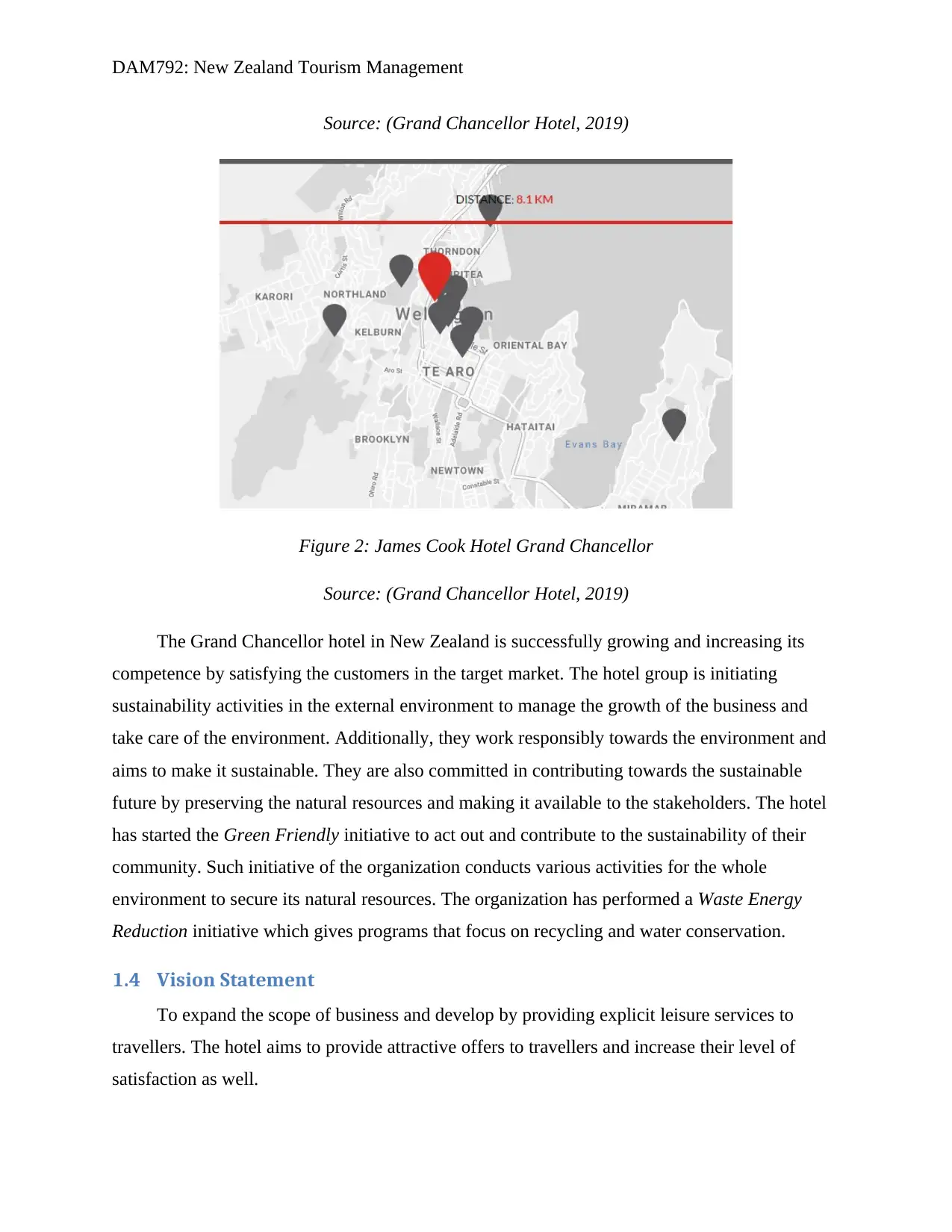
DAM792: New Zealand Tourism Management
Source: (Grand Chancellor Hotel, 2019)
Figure 2: James Cook Hotel Grand Chancellor
Source: (Grand Chancellor Hotel, 2019)
The Grand Chancellor hotel in New Zealand is successfully growing and increasing its
competence by satisfying the customers in the target market. The hotel group is initiating
sustainability activities in the external environment to manage the growth of the business and
take care of the environment. Additionally, they work responsibly towards the environment and
aims to make it sustainable. They are also committed in contributing towards the sustainable
future by preserving the natural resources and making it available to the stakeholders. The hotel
has started the Green Friendly initiative to act out and contribute to the sustainability of their
community. Such initiative of the organization conducts various activities for the whole
environment to secure its natural resources. The organization has performed a Waste Energy
Reduction initiative which gives programs that focus on recycling and water conservation.
1.4 Vision Statement
To expand the scope of business and develop by providing explicit leisure services to
travellers. The hotel aims to provide attractive offers to travellers and increase their level of
satisfaction as well.
Source: (Grand Chancellor Hotel, 2019)
Figure 2: James Cook Hotel Grand Chancellor
Source: (Grand Chancellor Hotel, 2019)
The Grand Chancellor hotel in New Zealand is successfully growing and increasing its
competence by satisfying the customers in the target market. The hotel group is initiating
sustainability activities in the external environment to manage the growth of the business and
take care of the environment. Additionally, they work responsibly towards the environment and
aims to make it sustainable. They are also committed in contributing towards the sustainable
future by preserving the natural resources and making it available to the stakeholders. The hotel
has started the Green Friendly initiative to act out and contribute to the sustainability of their
community. Such initiative of the organization conducts various activities for the whole
environment to secure its natural resources. The organization has performed a Waste Energy
Reduction initiative which gives programs that focus on recycling and water conservation.
1.4 Vision Statement
To expand the scope of business and develop by providing explicit leisure services to
travellers. The hotel aims to provide attractive offers to travellers and increase their level of
satisfaction as well.
⊘ This is a preview!⊘
Do you want full access?
Subscribe today to unlock all pages.

Trusted by 1+ million students worldwide
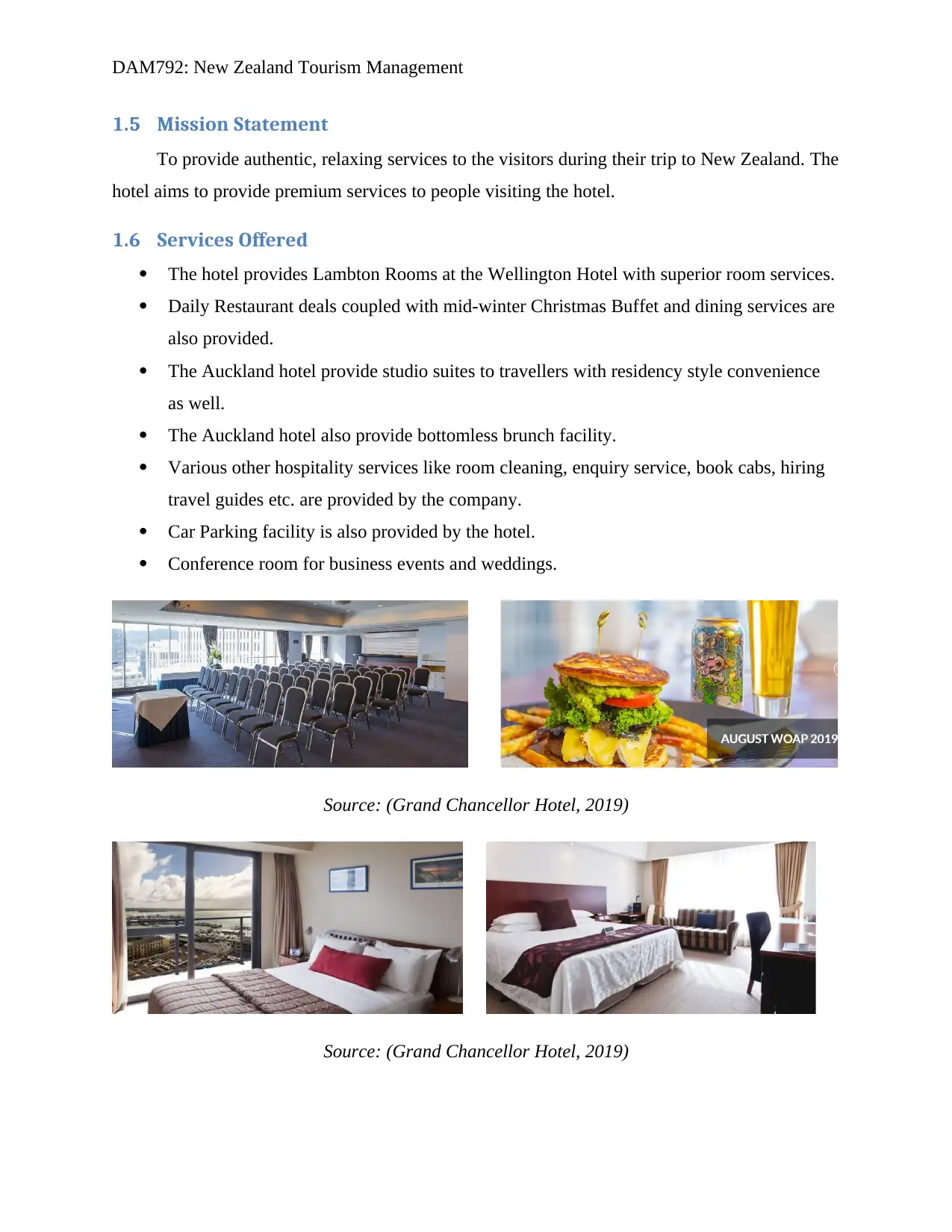
DAM792: New Zealand Tourism Management
1.5 Mission Statement
To provide authentic, relaxing services to the visitors during their trip to New Zealand. The
hotel aims to provide premium services to people visiting the hotel.
1.6 Services Offered
The hotel provides Lambton Rooms at the Wellington Hotel with superior room services.
Daily Restaurant deals coupled with mid-winter Christmas Buffet and dining services are
also provided.
The Auckland hotel provide studio suites to travellers with residency style convenience
as well.
The Auckland hotel also provide bottomless brunch facility.
Various other hospitality services like room cleaning, enquiry service, book cabs, hiring
travel guides etc. are provided by the company.
Car Parking facility is also provided by the hotel.
Conference room for business events and weddings.
Source: (Grand Chancellor Hotel, 2019)
Source: (Grand Chancellor Hotel, 2019)
1.5 Mission Statement
To provide authentic, relaxing services to the visitors during their trip to New Zealand. The
hotel aims to provide premium services to people visiting the hotel.
1.6 Services Offered
The hotel provides Lambton Rooms at the Wellington Hotel with superior room services.
Daily Restaurant deals coupled with mid-winter Christmas Buffet and dining services are
also provided.
The Auckland hotel provide studio suites to travellers with residency style convenience
as well.
The Auckland hotel also provide bottomless brunch facility.
Various other hospitality services like room cleaning, enquiry service, book cabs, hiring
travel guides etc. are provided by the company.
Car Parking facility is also provided by the hotel.
Conference room for business events and weddings.
Source: (Grand Chancellor Hotel, 2019)
Source: (Grand Chancellor Hotel, 2019)
Paraphrase This Document
Need a fresh take? Get an instant paraphrase of this document with our AI Paraphraser
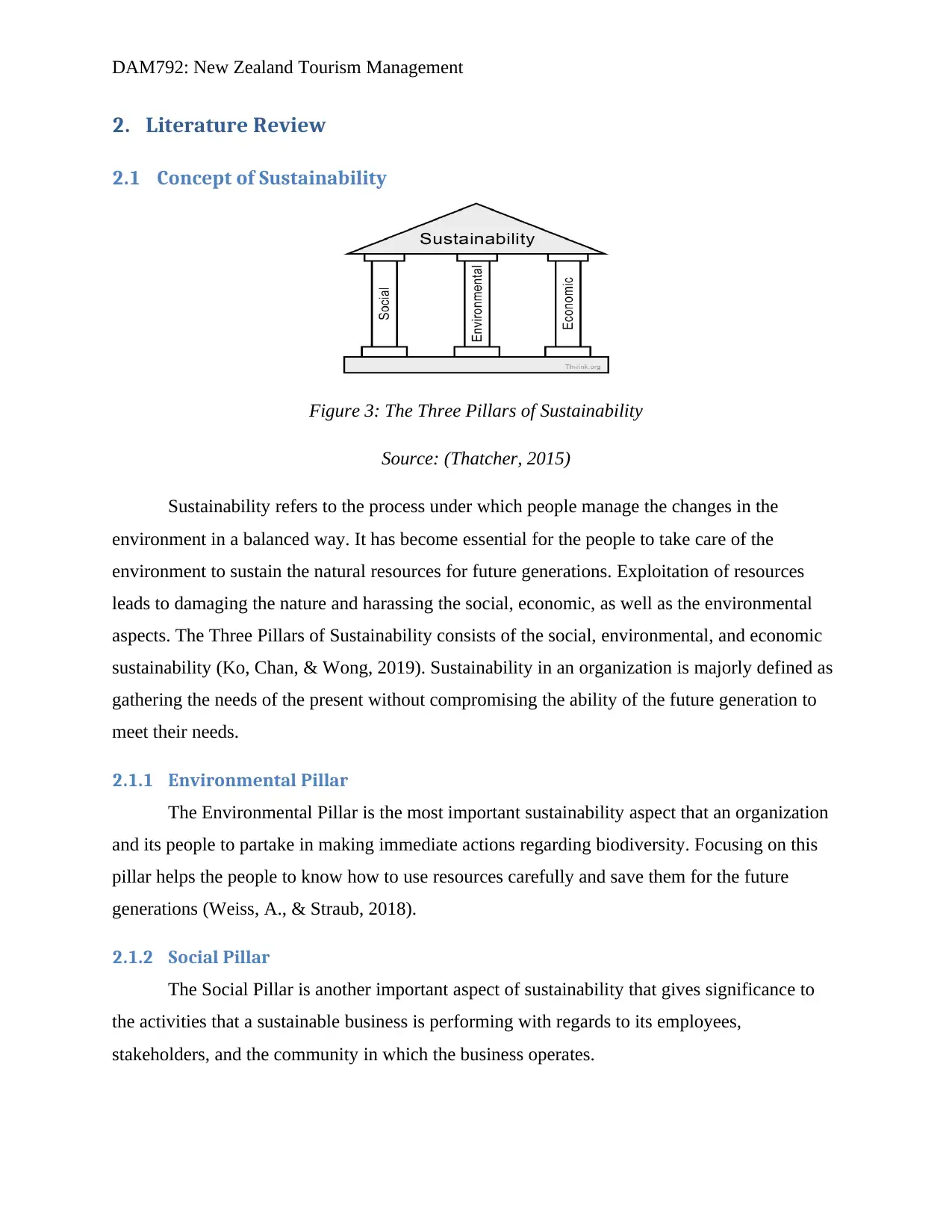
DAM792: New Zealand Tourism Management
2. Literature Review
2.1 Concept of Sustainability
Figure 3: The Three Pillars of Sustainability
Source: (Thatcher, 2015)
Sustainability refers to the process under which people manage the changes in the
environment in a balanced way. It has become essential for the people to take care of the
environment to sustain the natural resources for future generations. Exploitation of resources
leads to damaging the nature and harassing the social, economic, as well as the environmental
aspects. The Three Pillars of Sustainability consists of the social, environmental, and economic
sustainability (Ko, Chan, & Wong, 2019). Sustainability in an organization is majorly defined as
gathering the needs of the present without compromising the ability of the future generation to
meet their needs.
2.1.1 Environmental Pillar
The Environmental Pillar is the most important sustainability aspect that an organization
and its people to partake in making immediate actions regarding biodiversity. Focusing on this
pillar helps the people to know how to use resources carefully and save them for the future
generations (Weiss, A., & Straub, 2018).
2.1.2 Social Pillar
The Social Pillar is another important aspect of sustainability that gives significance to
the activities that a sustainable business is performing with regards to its employees,
stakeholders, and the community in which the business operates.
2. Literature Review
2.1 Concept of Sustainability
Figure 3: The Three Pillars of Sustainability
Source: (Thatcher, 2015)
Sustainability refers to the process under which people manage the changes in the
environment in a balanced way. It has become essential for the people to take care of the
environment to sustain the natural resources for future generations. Exploitation of resources
leads to damaging the nature and harassing the social, economic, as well as the environmental
aspects. The Three Pillars of Sustainability consists of the social, environmental, and economic
sustainability (Ko, Chan, & Wong, 2019). Sustainability in an organization is majorly defined as
gathering the needs of the present without compromising the ability of the future generation to
meet their needs.
2.1.1 Environmental Pillar
The Environmental Pillar is the most important sustainability aspect that an organization
and its people to partake in making immediate actions regarding biodiversity. Focusing on this
pillar helps the people to know how to use resources carefully and save them for the future
generations (Weiss, A., & Straub, 2018).
2.1.2 Social Pillar
The Social Pillar is another important aspect of sustainability that gives significance to
the activities that a sustainable business is performing with regards to its employees,
stakeholders, and the community in which the business operates.
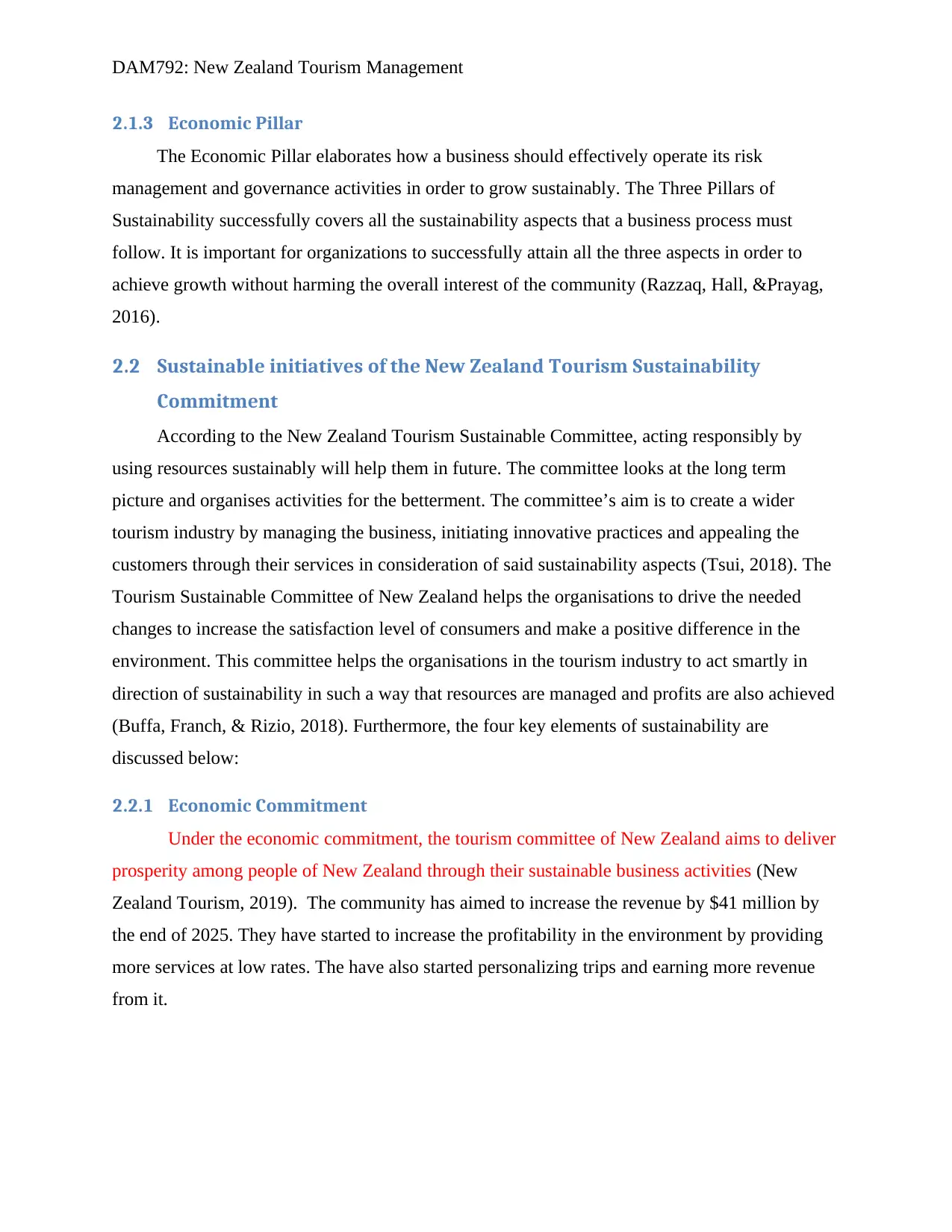
DAM792: New Zealand Tourism Management
2.1.3 Economic Pillar
The Economic Pillar elaborates how a business should effectively operate its risk
management and governance activities in order to grow sustainably. The Three Pillars of
Sustainability successfully covers all the sustainability aspects that a business process must
follow. It is important for organizations to successfully attain all the three aspects in order to
achieve growth without harming the overall interest of the community (Razzaq, Hall, &Prayag,
2016).
2.2 Sustainable initiatives of the New Zealand Tourism Sustainability
Commitment
According to the New Zealand Tourism Sustainable Committee, acting responsibly by
using resources sustainably will help them in future. The committee looks at the long term
picture and organises activities for the betterment. The committee’s aim is to create a wider
tourism industry by managing the business, initiating innovative practices and appealing the
customers through their services in consideration of said sustainability aspects (Tsui, 2018). The
Tourism Sustainable Committee of New Zealand helps the organisations to drive the needed
changes to increase the satisfaction level of consumers and make a positive difference in the
environment. This committee helps the organisations in the tourism industry to act smartly in
direction of sustainability in such a way that resources are managed and profits are also achieved
(Buffa, Franch, & Rizio, 2018). Furthermore, the four key elements of sustainability are
discussed below:
2.2.1 Economic Commitment
Under the economic commitment, the tourism committee of New Zealand aims to deliver
prosperity among people of New Zealand through their sustainable business activities (New
Zealand Tourism, 2019). The community has aimed to increase the revenue by $41 million by
the end of 2025. They have started to increase the profitability in the environment by providing
more services at low rates. The have also started personalizing trips and earning more revenue
from it.
2.1.3 Economic Pillar
The Economic Pillar elaborates how a business should effectively operate its risk
management and governance activities in order to grow sustainably. The Three Pillars of
Sustainability successfully covers all the sustainability aspects that a business process must
follow. It is important for organizations to successfully attain all the three aspects in order to
achieve growth without harming the overall interest of the community (Razzaq, Hall, &Prayag,
2016).
2.2 Sustainable initiatives of the New Zealand Tourism Sustainability
Commitment
According to the New Zealand Tourism Sustainable Committee, acting responsibly by
using resources sustainably will help them in future. The committee looks at the long term
picture and organises activities for the betterment. The committee’s aim is to create a wider
tourism industry by managing the business, initiating innovative practices and appealing the
customers through their services in consideration of said sustainability aspects (Tsui, 2018). The
Tourism Sustainable Committee of New Zealand helps the organisations to drive the needed
changes to increase the satisfaction level of consumers and make a positive difference in the
environment. This committee helps the organisations in the tourism industry to act smartly in
direction of sustainability in such a way that resources are managed and profits are also achieved
(Buffa, Franch, & Rizio, 2018). Furthermore, the four key elements of sustainability are
discussed below:
2.2.1 Economic Commitment
Under the economic commitment, the tourism committee of New Zealand aims to deliver
prosperity among people of New Zealand through their sustainable business activities (New
Zealand Tourism, 2019). The community has aimed to increase the revenue by $41 million by
the end of 2025. They have started to increase the profitability in the environment by providing
more services at low rates. The have also started personalizing trips and earning more revenue
from it.
⊘ This is a preview!⊘
Do you want full access?
Subscribe today to unlock all pages.

Trusted by 1+ million students worldwide
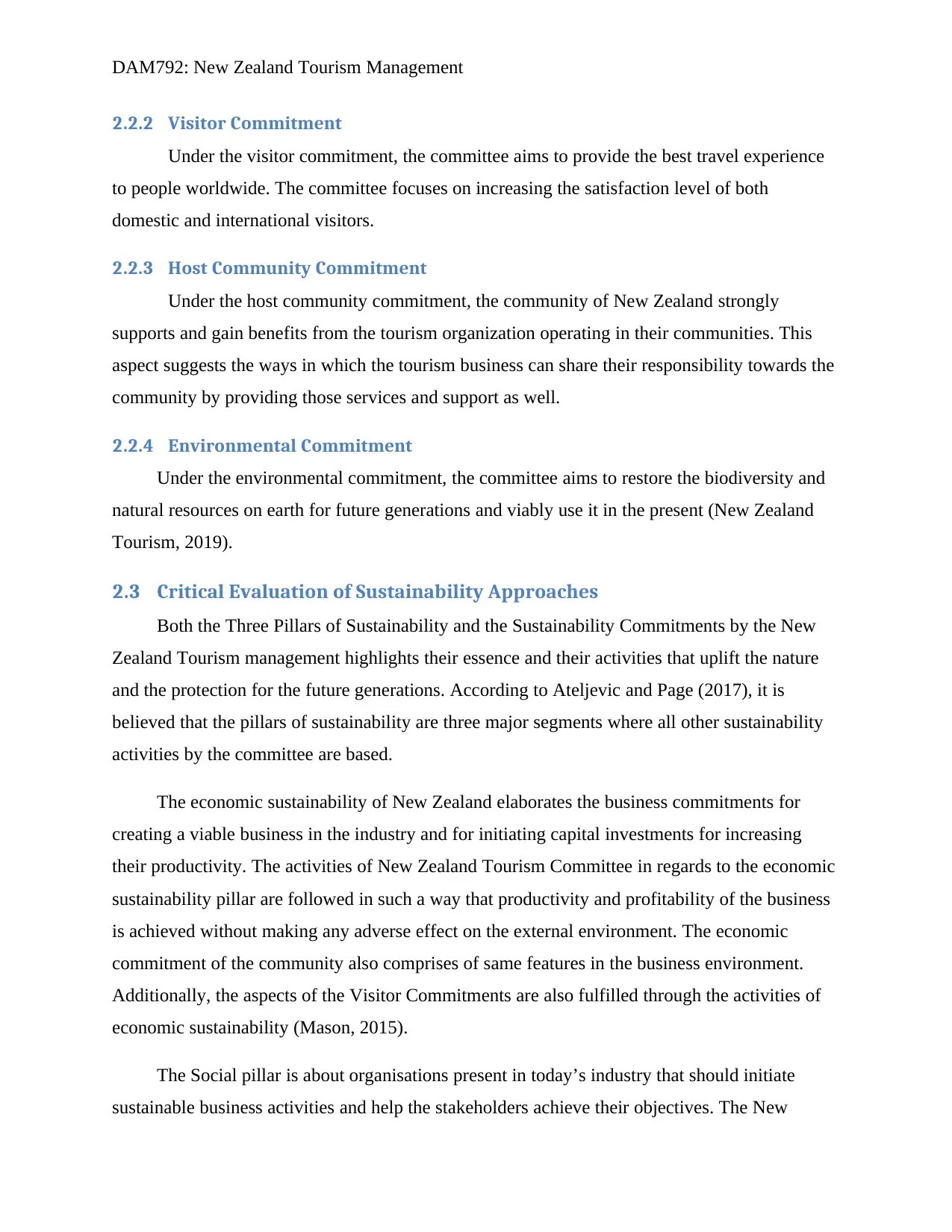
DAM792: New Zealand Tourism Management
2.2.2 Visitor Commitment
Under the visitor commitment, the committee aims to provide the best travel experience
to people worldwide. The committee focuses on increasing the satisfaction level of both
domestic and international visitors.
2.2.3 Host Community Commitment
Under the host community commitment, the community of New Zealand strongly
supports and gain benefits from the tourism organization operating in their communities. This
aspect suggests the ways in which the tourism business can share their responsibility towards the
community by providing those services and support as well.
2.2.4 Environmental Commitment
Under the environmental commitment, the committee aims to restore the biodiversity and
natural resources on earth for future generations and viably use it in the present (New Zealand
Tourism, 2019).
2.3 Critical Evaluation of Sustainability Approaches
Both the Three Pillars of Sustainability and the Sustainability Commitments by the New
Zealand Tourism management highlights their essence and their activities that uplift the nature
and the protection for the future generations. According to Ateljevic and Page (2017), it is
believed that the pillars of sustainability are three major segments where all other sustainability
activities by the committee are based.
The economic sustainability of New Zealand elaborates the business commitments for
creating a viable business in the industry and for initiating capital investments for increasing
their productivity. The activities of New Zealand Tourism Committee in regards to the economic
sustainability pillar are followed in such a way that productivity and profitability of the business
is achieved without making any adverse effect on the external environment. The economic
commitment of the community also comprises of same features in the business environment.
Additionally, the aspects of the Visitor Commitments are also fulfilled through the activities of
economic sustainability (Mason, 2015).
The Social pillar is about organisations present in today’s industry that should initiate
sustainable business activities and help the stakeholders achieve their objectives. The New
2.2.2 Visitor Commitment
Under the visitor commitment, the committee aims to provide the best travel experience
to people worldwide. The committee focuses on increasing the satisfaction level of both
domestic and international visitors.
2.2.3 Host Community Commitment
Under the host community commitment, the community of New Zealand strongly
supports and gain benefits from the tourism organization operating in their communities. This
aspect suggests the ways in which the tourism business can share their responsibility towards the
community by providing those services and support as well.
2.2.4 Environmental Commitment
Under the environmental commitment, the committee aims to restore the biodiversity and
natural resources on earth for future generations and viably use it in the present (New Zealand
Tourism, 2019).
2.3 Critical Evaluation of Sustainability Approaches
Both the Three Pillars of Sustainability and the Sustainability Commitments by the New
Zealand Tourism management highlights their essence and their activities that uplift the nature
and the protection for the future generations. According to Ateljevic and Page (2017), it is
believed that the pillars of sustainability are three major segments where all other sustainability
activities by the committee are based.
The economic sustainability of New Zealand elaborates the business commitments for
creating a viable business in the industry and for initiating capital investments for increasing
their productivity. The activities of New Zealand Tourism Committee in regards to the economic
sustainability pillar are followed in such a way that productivity and profitability of the business
is achieved without making any adverse effect on the external environment. The economic
commitment of the community also comprises of same features in the business environment.
Additionally, the aspects of the Visitor Commitments are also fulfilled through the activities of
economic sustainability (Mason, 2015).
The Social pillar is about organisations present in today’s industry that should initiate
sustainable business activities and help the stakeholders achieve their objectives. The New
Paraphrase This Document
Need a fresh take? Get an instant paraphrase of this document with our AI Paraphraser
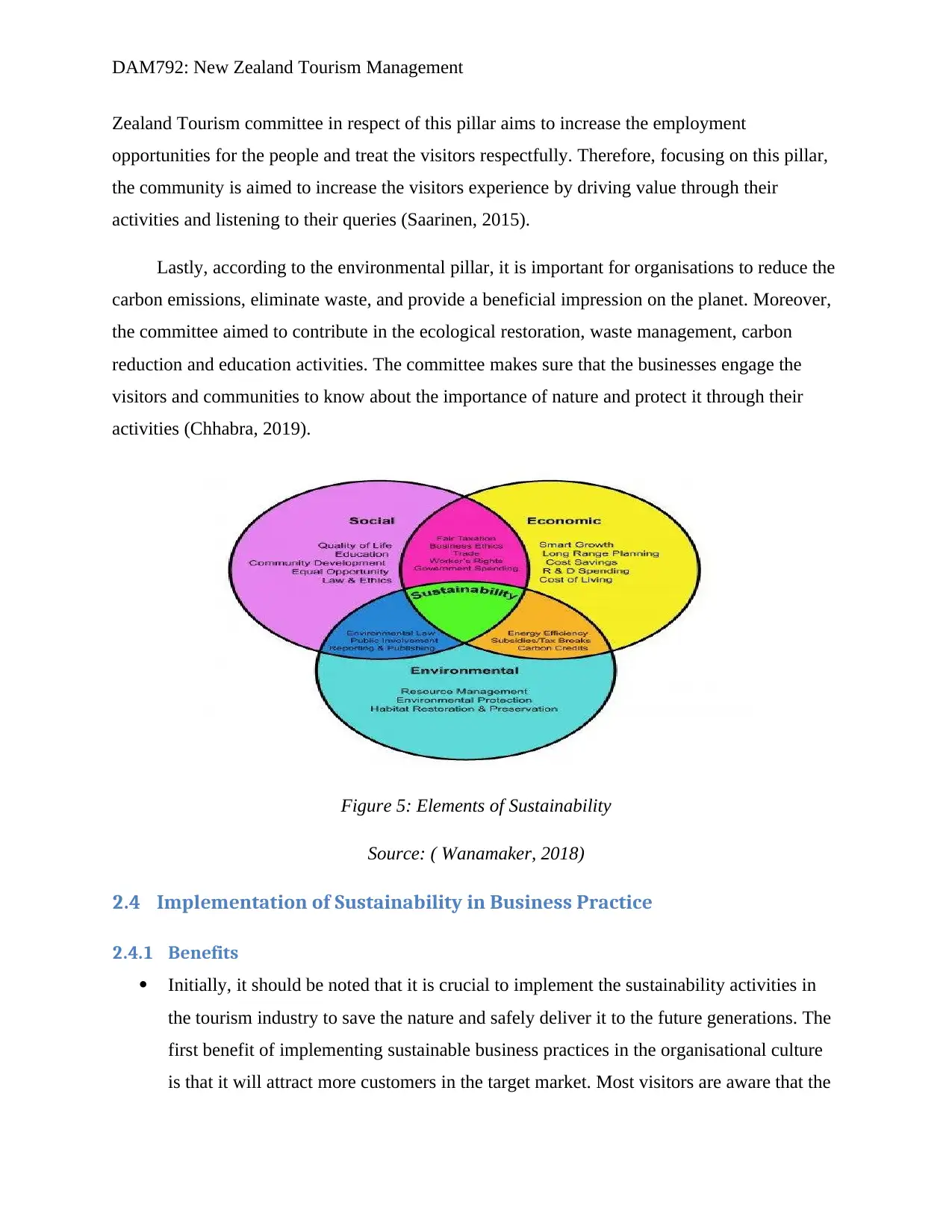
DAM792: New Zealand Tourism Management
Zealand Tourism committee in respect of this pillar aims to increase the employment
opportunities for the people and treat the visitors respectfully. Therefore, focusing on this pillar,
the community is aimed to increase the visitors experience by driving value through their
activities and listening to their queries (Saarinen, 2015).
Lastly, according to the environmental pillar, it is important for organisations to reduce the
carbon emissions, eliminate waste, and provide a beneficial impression on the planet. Moreover,
the committee aimed to contribute in the ecological restoration, waste management, carbon
reduction and education activities. The committee makes sure that the businesses engage the
visitors and communities to know about the importance of nature and protect it through their
activities (Chhabra, 2019).
Figure 5: Elements of Sustainability
Source: ( Wanamaker, 2018)
2.4 Implementation of Sustainability in Business Practice
2.4.1 Benefits
Initially, it should be noted that it is crucial to implement the sustainability activities in
the tourism industry to save the nature and safely deliver it to the future generations. The
first benefit of implementing sustainable business practices in the organisational culture
is that it will attract more customers in the target market. Most visitors are aware that the
Zealand Tourism committee in respect of this pillar aims to increase the employment
opportunities for the people and treat the visitors respectfully. Therefore, focusing on this pillar,
the community is aimed to increase the visitors experience by driving value through their
activities and listening to their queries (Saarinen, 2015).
Lastly, according to the environmental pillar, it is important for organisations to reduce the
carbon emissions, eliminate waste, and provide a beneficial impression on the planet. Moreover,
the committee aimed to contribute in the ecological restoration, waste management, carbon
reduction and education activities. The committee makes sure that the businesses engage the
visitors and communities to know about the importance of nature and protect it through their
activities (Chhabra, 2019).
Figure 5: Elements of Sustainability
Source: ( Wanamaker, 2018)
2.4 Implementation of Sustainability in Business Practice
2.4.1 Benefits
Initially, it should be noted that it is crucial to implement the sustainability activities in
the tourism industry to save the nature and safely deliver it to the future generations. The
first benefit of implementing sustainable business practices in the organisational culture
is that it will attract more customers in the target market. Most visitors are aware that the
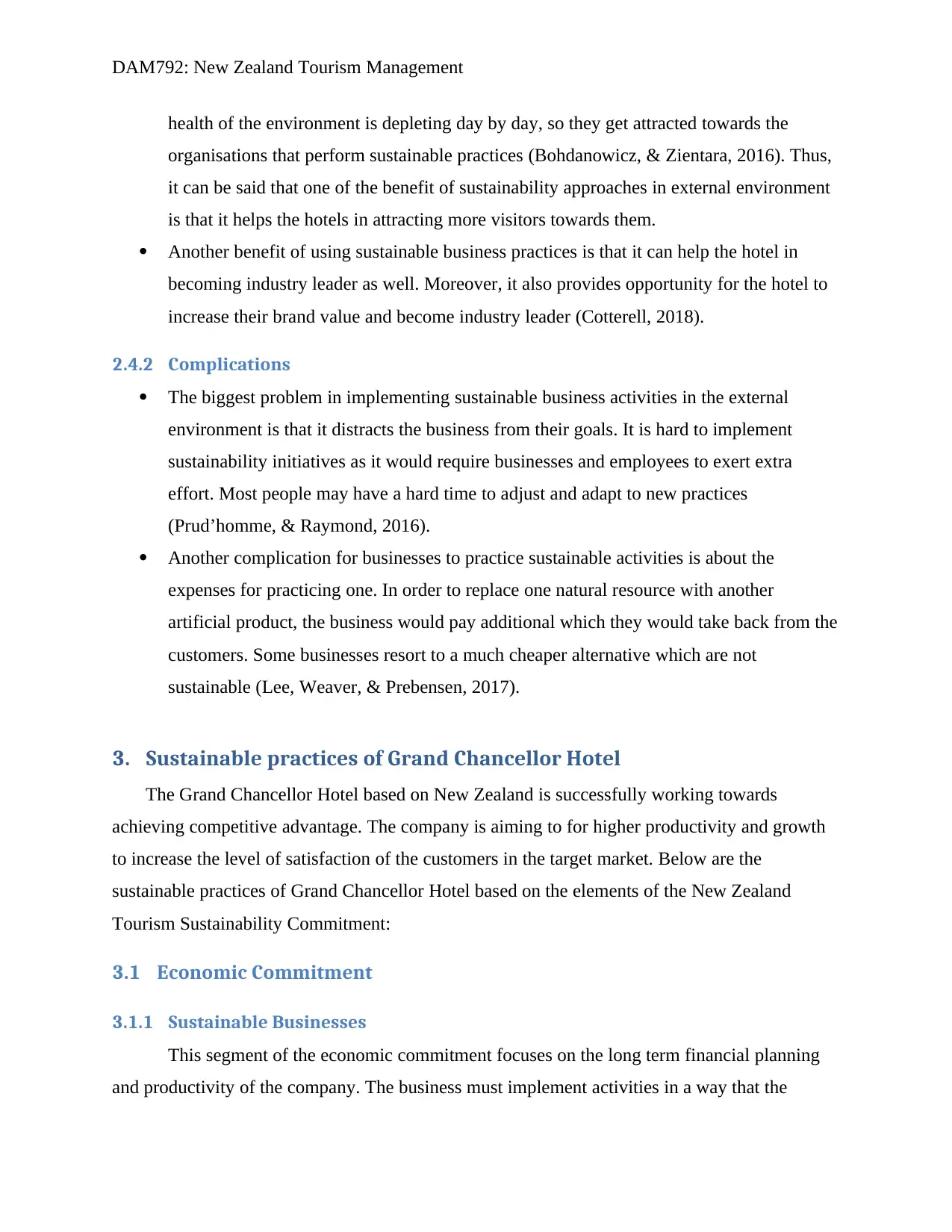
DAM792: New Zealand Tourism Management
health of the environment is depleting day by day, so they get attracted towards the
organisations that perform sustainable practices (Bohdanowicz, & Zientara, 2016). Thus,
it can be said that one of the benefit of sustainability approaches in external environment
is that it helps the hotels in attracting more visitors towards them.
Another benefit of using sustainable business practices is that it can help the hotel in
becoming industry leader as well. Moreover, it also provides opportunity for the hotel to
increase their brand value and become industry leader (Cotterell, 2018).
2.4.2 Complications
The biggest problem in implementing sustainable business activities in the external
environment is that it distracts the business from their goals. It is hard to implement
sustainability initiatives as it would require businesses and employees to exert extra
effort. Most people may have a hard time to adjust and adapt to new practices
(Prud’homme, & Raymond, 2016).
Another complication for businesses to practice sustainable activities is about the
expenses for practicing one. In order to replace one natural resource with another
artificial product, the business would pay additional which they would take back from the
customers. Some businesses resort to a much cheaper alternative which are not
sustainable (Lee, Weaver, & Prebensen, 2017).
3. Sustainable practices of Grand Chancellor Hotel
The Grand Chancellor Hotel based on New Zealand is successfully working towards
achieving competitive advantage. The company is aiming to for higher productivity and growth
to increase the level of satisfaction of the customers in the target market. Below are the
sustainable practices of Grand Chancellor Hotel based on the elements of the New Zealand
Tourism Sustainability Commitment:
3.1 Economic Commitment
3.1.1 Sustainable Businesses
This segment of the economic commitment focuses on the long term financial planning
and productivity of the company. The business must implement activities in a way that the
health of the environment is depleting day by day, so they get attracted towards the
organisations that perform sustainable practices (Bohdanowicz, & Zientara, 2016). Thus,
it can be said that one of the benefit of sustainability approaches in external environment
is that it helps the hotels in attracting more visitors towards them.
Another benefit of using sustainable business practices is that it can help the hotel in
becoming industry leader as well. Moreover, it also provides opportunity for the hotel to
increase their brand value and become industry leader (Cotterell, 2018).
2.4.2 Complications
The biggest problem in implementing sustainable business activities in the external
environment is that it distracts the business from their goals. It is hard to implement
sustainability initiatives as it would require businesses and employees to exert extra
effort. Most people may have a hard time to adjust and adapt to new practices
(Prud’homme, & Raymond, 2016).
Another complication for businesses to practice sustainable activities is about the
expenses for practicing one. In order to replace one natural resource with another
artificial product, the business would pay additional which they would take back from the
customers. Some businesses resort to a much cheaper alternative which are not
sustainable (Lee, Weaver, & Prebensen, 2017).
3. Sustainable practices of Grand Chancellor Hotel
The Grand Chancellor Hotel based on New Zealand is successfully working towards
achieving competitive advantage. The company is aiming to for higher productivity and growth
to increase the level of satisfaction of the customers in the target market. Below are the
sustainable practices of Grand Chancellor Hotel based on the elements of the New Zealand
Tourism Sustainability Commitment:
3.1 Economic Commitment
3.1.1 Sustainable Businesses
This segment of the economic commitment focuses on the long term financial planning
and productivity of the company. The business must implement activities in a way that the
⊘ This is a preview!⊘
Do you want full access?
Subscribe today to unlock all pages.

Trusted by 1+ million students worldwide
1 out of 22
Related Documents
Your All-in-One AI-Powered Toolkit for Academic Success.
+13062052269
info@desklib.com
Available 24*7 on WhatsApp / Email
![[object Object]](/_next/static/media/star-bottom.7253800d.svg)
Unlock your academic potential
Copyright © 2020–2026 A2Z Services. All Rights Reserved. Developed and managed by ZUCOL.





